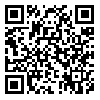

BibTeX | RIS | EndNote | Medlars | ProCite | Reference Manager | RefWorks
Send citation to:
URL: http://jdisabilstud.org/article-1-3004-en.html
2- MA in Counseling and Guidance, Rodhan Branch, Islamic Azad University, Tehran, Iran
3- Professor of the Department of Psychology, Hozah and University Research Institute, Tehran, Iran
Abstract
Background & Objectives: Obsessive-compulsive disorder is diagnosed based on the presence of unwanted and disturbing thoughts and repetitive behaviors. It was found that guilt can arise from extreme expectations and obsessive behaviors. If these symptoms are severe, a form of obsessive–compulsive disorder is created, the nature of which is determined by intrusive thoughts and images and unwanted compulsive behaviors. On the other hand, research has shown that personality, with its differences in emotion and cognition, can be considered a predisposing factor for developing psychiatric disorders such as obsessive–compulsive disorder. Several psychological treatment methods have been used in addition to drug therapy, including psychoanalysis, behavioral therapy, cognitive therapy, acceptance and commitment therapy, family therapy, and so on. As a short–term treatment, cognitive–analytic therapy effectively works to solve problems and strengthen the patient's motivation to make lifestyle changes by adopting a knowledge–based approach. So, the present study aims to determine the effectiveness of the cognitive–analytical intervention of group–based treatment of obsessions on guilt and personality functioning in people with obsessive–compulsive symptoms.
Methods: This research method was quasi–experimental with a pre–test–posttest design with one experimental group and one control group. The statistical population of the current research comprised all people suffering from obsessive–compulsive disorder who were referred to Talieh Salamat Clinic in Tehran City, Iran, in 2021. Due to the lack of easy access, this research used an available sampling method. In this way, 30 people were selected from the statistical population and randomly divided into the experimental and control groups (each group included 15 people). Then, both groups responded to the Guilt Questionnaire (Kugler and Jones, 1992) and the Personality Functioning Questionnaire (Janbozorgi et al., 2022). After that, the obsession treatment intervention was implemented in the experimental group, and the control group was not subjected to any treatment program. In the end, the posttest was done again from both groups. Also, after the end of the research, the treatment programs implemented in this research were implemented in the control group to maintain ethical standards. The inclusion criteria included suffering from obsessive–compulsive disorder, at least having a diploma level of education, not participating in other therapeutic interventions at the same time, and not suffering from another psychological disease at the same time. The exclusion criteria included the absence of more than three therapy sessions and non–observance of group therapy rules. This study's ethical standards included obtaining informed consent and ensuring privacy and confidentiality. Also, during the research, participants were free to withdraw from the study at any time and to provide personal information. They were assured that the information would remain confidential, and this was also fully observed. Data analysis was carried out in two parts: descriptive statistics and inferential statistics. At the level of descriptive statistics, frequency, percentage, mean, and standard deviation were used. Multivariate covariance analysis was used at the level of inferential statistics. Data analysis was done using SPSS software version 24, and the significance level of the tests was considered to be 0.05.
Results: The results showed that cognitive–analytical intervention for obsessive–compulsive disorder treatment improved the scores of the components of identity, intimacy, empathy, psychosis, burnout, negative affectivity, and conflict in the personality functioning variable and all components of the guilt variable, including moral standards, trait guilt, and state guilt, in individuals with obsessive–compulsive symptoms (p<0.001).
Conclusion: According to the study results, treating obsessions with a cognitive–analytical approach improves guilt and personality functioning in people with symptoms of obsessive–compulsive disorder. Therefore, it is recommended that researchers and therapists use this method for their patients.
| Rights and permissions | |
 |
This work is licensed under a Creative Commons Attribution-NonCommercial 4.0 International License. |


